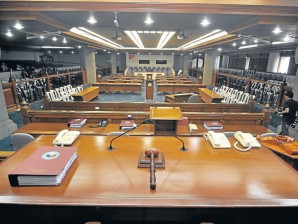Senate OKs 2 money-laundering bills
The Senate on Wednesday gave its final nod to two antimoney laundering bills expected to spare the country from the blacklist of a global-based finance organization that monitors possible funding for terrorist groups.
However, Congress’ failure to pass a third related bill is causing anxiety among some senators who fear that inaction on the measure could be a reason to relegate the country on the blacklist of the Finance Action Task Force (FATF).
Inclusion in the FATF’s blacklist makes it more difficult for local banks to engage in international transactions.
Overseas Filipino workers would have to submit more documentary and other requirements before they can send remittances to the Philippines.
So far, the country already lingers in the FATF’s dark grey list.
Article continues after this advertisementThe organization has given the Philippines until June 18 when its leaders meet in Paris to enact the three bills into law.
Article continues after this advertisementLack of time as a result of the Senate’s focus on erstwhile Chief Justice Renato Corona’s impeachment trial forced it to act on only two measures.
Late Wednesday afternoon, it finally ratified an amendment to the Anti-Money Laundering Act (AMLA) that would no longer require the Anti-Money Laundering Council (AMLC) to inform a suspected launderer that his bank deposits are being monitored.
The Senate also passed on third and final reading a bill that criminalizes financial support given to known terrorists.
As of Wednesday night, the House of Representatives had also ratified the AMLA amendment. It is expected to adopt the Senate version of the second measure to meet the FATF deadline.
Wednesday was the last day of the congressional session. It adjourns Thursday, which means it cannot act on pending measures.
A third bill eyed by the FATF that expands the coverage of predicate crimes to justify the examination of a suspected launderer’s deposits remains pending.
Senate President Enrile hopes that the FATF would still take cognizance of Congress’ efforts.
Senator Sergio Osmena III and Teofisto Guingona III both admitted in separate interviews they were unsure whether passage of two instead of three bills would satisfy the FATF.
Senator Joker Arroyo, however, said that while the framing of Senate Bill 3009 that allows the AMLC to unilaterally check a suspect’s bank accounts is commendable, “I am not comfortable with the wording.”
Arroyo had always maintained a cautious position on the bill, warning that a sitting President could use it to harass his political enemies.
Senate minority leader Alan Peter Cayetano noted that one concern was “balancing transparency and the prevention of abuses and (the bill’s) possible use for political persecution.”
“One must still be assured that she or he will enjoy the perks of privacy without fear of undue exposure,” he explained. Michael Ubac
